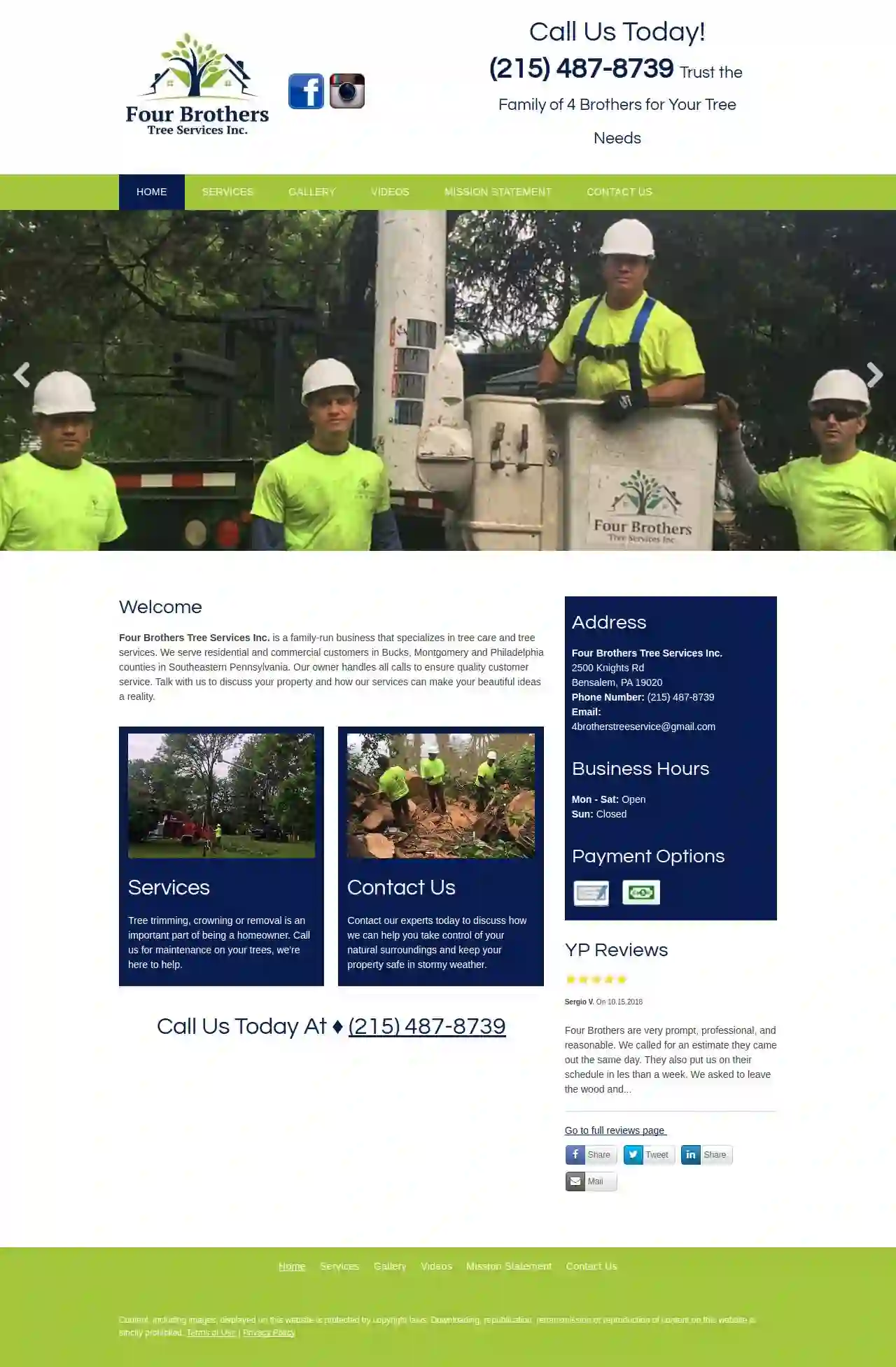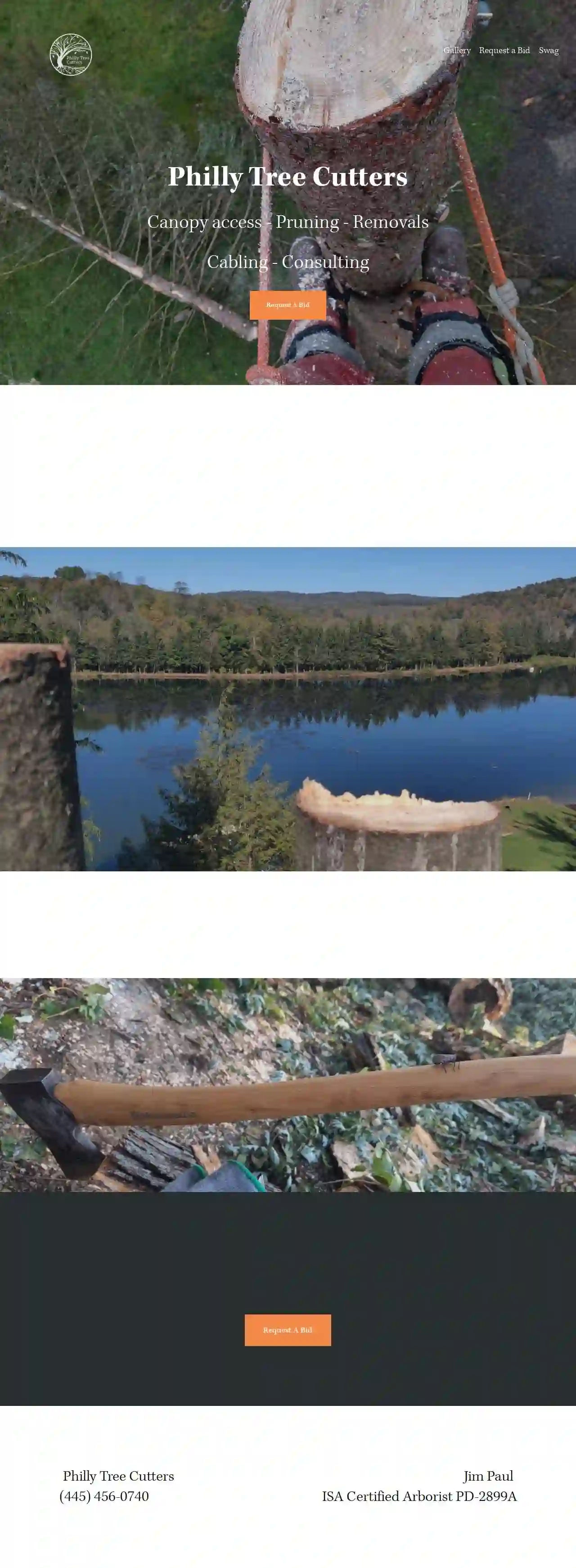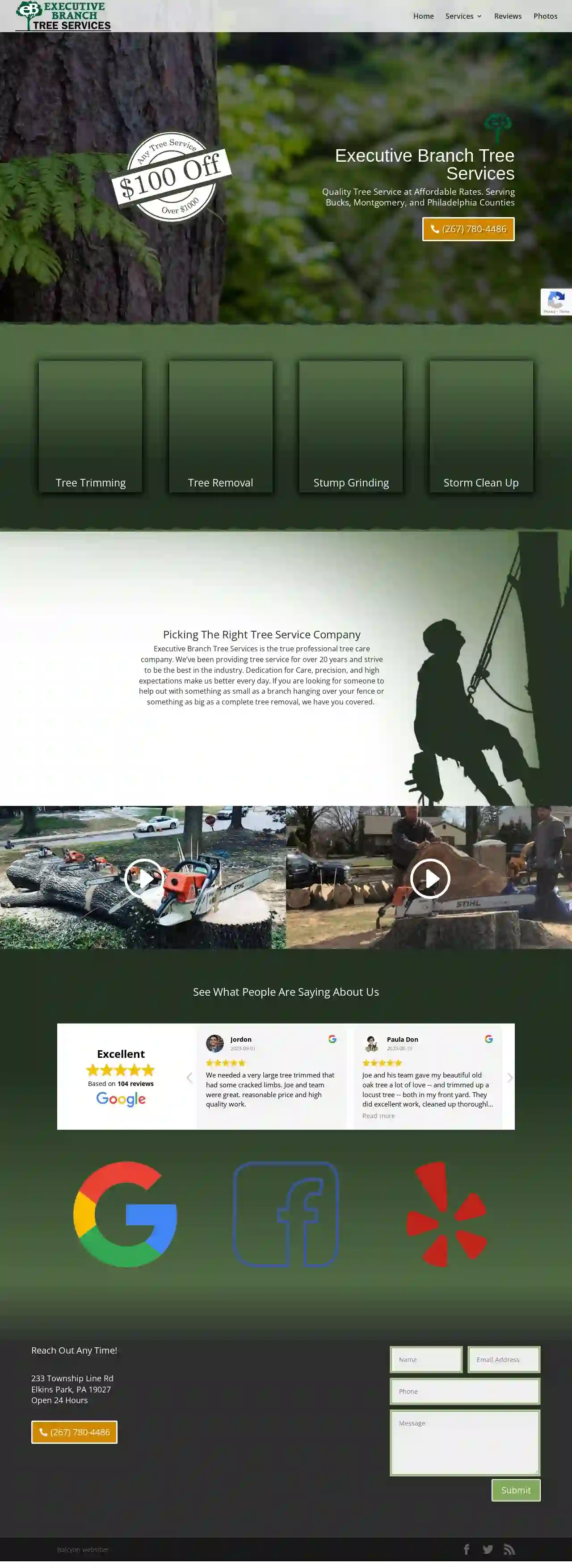Tree Service Beaver Falls
Find the best Tree Service in Beaver Falls
Get multiple Tree Service quotes for your project today! Compare profiles, reviews, accreditations, portfolio, etc... and choose the best offer.

Four Brothers Tree Service Inc.
4.896 reviewsFour Brothers Tree Services Inc., 2500 Knights Rd, Bensalem, 19020, USFour Brothers Tree Services Inc. is a family-run business specializing in tree care and tree services. We serve residential and commercial customers in Bucks, Montgomery, and Philadelphia counties in Southeastern Pennsylvania. Our owner handles all calls to ensure quality customer service. We offer services such as tree trimming, crowning, or removal, and we're here to help with maintenance on your trees.
- Services
- Why Us?
- Accreditations
- Our Team
- Testimonials
- Gallery
Get Quote
Carl's Tree Service
4.537 reviews3908 Homestead-Duquesne Road, West Mifflin, 15122, USFamily owned and operated since 1969, Carl's Tree Service is a full-service company that has provided professional tree services throughout the Pittsburgh, PA, area. Our certified arborists are well-versed in removing large and hazardous trees and completing fine trim work. We offer a full line of tree care services, including tree removal, tree trimming, stump grinding, brush chipping, lot clearing, emergency storm clean-up, landscape design, commercial snow removal, and more. Our team is dedicated to providing the best quality tree services at an honest and fair price, with safety being our top priority.
- Services
- Why Us?
- Accreditations
- Our Team
- Testimonials
- Gallery
Get Quote
ECO Tree service
4.891 reviews1137 Sioux St., Bethlehem, PA 18015, 18015, USECO Tree Service is a comprehensive tree service company that provides top-notch service tailored to your unique needs and budget. From routine tree trimming to emergency tree removal, our skilled staff is equipped to handle your project with precision and expertise. We are fully insured for your peace of mind and offer competitive prices. Our primary service area includes Allentown, Bethlehem, and surrounding areas.
- Services
- Why Us?
- Accreditations
- Our Team
- Testimonials
- Gallery
Get Quote
Rick's Expert Tree Service, Inc.
4.8395 reviews1907 Bensalem Blvd, Bensalem, PA 19020, 19020, USRick's Expert Tree Service is a leading tree service company in Bucks County, PA, offering a wide range of services including tree removal, trimming, pruning, lot clearing, stump removal, emergency storm work, crane operation, and firewood supply. With over 20 years of experience, the company is built on hard work and honesty, providing fully insured, licensed, and certified professionals. Their goal is to provide exceptional service in the most efficient way, with customer satisfaction guaranteed through their 'no payment till the job is complete' policy.
- Services
- Why Us?
- Accreditations
- Our Team
- Testimonials
- Gallery
Get Quote
Felix Tree Service LLC
53 reviewsFelix Tree Service LLC, 123 Tree Lane, Treeville, 12345, USFelix Tree Service LLC is a professional tree care company dedicated to providing top-quality services to homeowners and businesses. Our team of experienced arborists is equipped with the latest equipment and techniques to ensure your trees receive the best care possible. From tree pruning and removal to plant health care and emergency services, we offer a wide range of solutions to meet your specific needs. At Felix Tree Service LLC, we are committed to maintaining the health and beauty of your trees while promoting a safe and sustainable environment.
- Services
- Why Us?
- Accreditations
- Our Team
- Testimonials
- Gallery
Get Quote
BetterScapes (Lawn, Shrub and Tree Care)
5172 reviewsPO Box 211, Hellertown, 18055, USBetterScapes is a tree care company providing safe, reliable tree services to residential and commercial customers servicing all Lehigh and Northampton Counties. We are known for challenging take-downs and difficult tree removals. In addition, we specialize in tree pruning, stump grinding, and tree maintenance. We also provide fast response emergency tree services, and crane services for larger tree removals. As a member of the Tree Care Industry Association (TCIA) we adhere to the highest quality standards. We also have our own high standards which include prompt courteous service and immaculate clean up. We’re fully licensed and insured.
- Services
- Why Us?
- Accreditations
- Our Team
- Testimonials
- Gallery
Get Quote
Champion Tree, LLC
518 reviews123 Main St, Suite 101, King of Prussia, 19406, USChampion Tree & Plant Health Care is dedicated to providing comprehensive and research-driven plant health care services. Our mission is to nurture the enduring well-being and vitality of your yard and trees. We offer a holistic approach to tree and plant health care, with a commitment to evolving Integrated Pest Management (IPM) strategies and utilizing effective, environmentally friendly products.
- Services
- Why Us?
- Accreditations
- Our Team
- Testimonials
- Gallery
Get Quote
Philly Tree Cutters
4.824 reviews1234 Market St, Philadelphia, PA, 19145, USPhilly Tree Cutters is a professional tree service company offering canopy access, pruning, removals, cabling, and consulting services. The company is led by Jim Paul, an ISA Certified Arborist with the certification number PD-2899A. The team at Philly Tree Cutters is dedicated to providing top-quality services to their clients.
- Services
- Why Us?
- Accreditations
- Our Team
- Gallery
Get Quote
Felty's Lawn & Tree Maintenance
4.912 reviewsUnknown, Harrisburg, USFelty's Lawn & Tree Maintenance is a family-owned and operated business that has been serving Harrisburg, PA, and the surrounding communities since 1980. They specialize in all types of exterior services, ranging from routine lawn mowing and maintenance to landscape design, tree removal, brush clearing, and more. Their team of specialists provide comprehensive outdoor services, including tree and shrub pruning, weed removal, installation of mulch, flowers, and more.
- Services
- Why Us?
- Accreditations
- Our Team
- Testimonials
- Gallery
Get Quote
Executive Branch Tree Services
4.9116 reviews233 Township Line Rd, Elkins Park, PA 19027, 19027, USExecutive Branch Tree Services is the true professional tree care company. We’ve been providing tree service for over 20 years and strive to be the best in the industry. Dedication for Care, precision, and high expectations make us better every day. If you are looking for someone to help out with something as small as a branch hanging over your fence or something as big as a complete tree removal, we have you covered.
- Services
- Why Us?
- Accreditations
- Our Team
- Testimonials
- Gallery
Get Quote
Over 16,467+ Tree Service Companies on our directory
Our tree service experts operate in Beaver Falls & surroundings!
TreeServiceMatch has curated and vetted the Best Arborists in and around Beaver Falls. Find a reliable business today.
Frequently Asked Questions About Tree Services
- Shallow Soil: In areas with thin or compacted soil, roots may not be able to penetrate deeply and instead grow near the surface.
- Soil Compaction: Heavy foot traffic, construction activities, or vehicles can compact the soil, making it difficult for roots to grow downward.
- Low Oxygen Levels: Roots need oxygen to survive, and in poorly drained or compacted soil, they may grow near the surface to access more oxygen.
- Seeking Nutrients: Roots may grow towards areas with higher nutrient concentrations, which can be near the surface in some cases.
- Tree Species: Some tree species are naturally prone to surface roots, such as maples, willows, and poplars.
- Age: As trees age, their root systems expand, and some roots may naturally grow closer to the surface.
- Communication: The first step is to talk to your neighbor and explain the issue. They may be willing to trim the roots or remove the tree if it's causing damage.
- Root Pruning: You can cut back the roots at the property line, but it's essential to do this carefully to avoid damaging the tree. Consult with a certified arborist for guidance on proper root pruning techniques.
- Root Barrier Installation: Installing a physical barrier, such as a thick plastic sheet or metal edging, can prevent roots from growing into your yard. The barrier should be at least 2 feet deep and extend several feet from the trunk.
- Chemical Control (Not Recommended): Chemical root killers are available, but they are generally not recommended due to potential environmental damage and the risk of harming the tree.
- Tree Protection Zone (TPZ): Establish a designated area around the trees that is off-limits to construction activities. The size of the TPZ depends on the tree's size and species, but generally, it should extend to the drip line (the outermost edge of the tree's canopy).
- Root Protection: Avoid digging, trenching, or compacting the soil within the TPZ. If excavation is necessary, use hand digging or air spading to minimize root disturbance.
- Trunk Protection: Protect tree trunks from damage by wrapping them with protective barriers, such as burlap or plywood.
- Branch Protection: Avoid cutting or damaging branches unless absolutely necessary. If pruning is required, have it done by a certified arborist.
- Watering: Ensure trees receive adequate water during construction, especially if the soil has been disturbed or compacted.
- Monitoring: Regularly monitor trees for signs of stress or damage during and after construction.
- Leaf discoloration or spots: Yellowing, browning, or spotting on leaves can indicate fungal infections, nutrient deficiencies, or other problems.
- Premature leaf drop: Losing leaves earlier than usual or outside of the normal seasonal cycle can be a sign of stress or disease.
- Dieback of branches: Branches dying from the tips inward can indicate disease, insect infestation, or drought stress.
- Cankers or lesions: Sunken or discolored areas on the bark can indicate fungal or bacterial infections.
- Mushrooms or conks growing on the trunk or roots: These are often signs of decay fungi.
- Wilting or drooping leaves: Can indicate a lack of water, root damage, or vascular disease.
Why do tree roots grow above ground?
How do I stop my neighbor's tree roots from growing into my yard?
What is the best way to protect trees during construction?
How do I know if my tree is diseased?
Why do tree roots grow above ground?
- Shallow Soil: In areas with thin or compacted soil, roots may not be able to penetrate deeply and instead grow near the surface.
- Soil Compaction: Heavy foot traffic, construction activities, or vehicles can compact the soil, making it difficult for roots to grow downward.
- Low Oxygen Levels: Roots need oxygen to survive, and in poorly drained or compacted soil, they may grow near the surface to access more oxygen.
- Seeking Nutrients: Roots may grow towards areas with higher nutrient concentrations, which can be near the surface in some cases.
- Tree Species: Some tree species are naturally prone to surface roots, such as maples, willows, and poplars.
- Age: As trees age, their root systems expand, and some roots may naturally grow closer to the surface.
How do I stop my neighbor's tree roots from growing into my yard?
- Communication: The first step is to talk to your neighbor and explain the issue. They may be willing to trim the roots or remove the tree if it's causing damage.
- Root Pruning: You can cut back the roots at the property line, but it's essential to do this carefully to avoid damaging the tree. Consult with a certified arborist for guidance on proper root pruning techniques.
- Root Barrier Installation: Installing a physical barrier, such as a thick plastic sheet or metal edging, can prevent roots from growing into your yard. The barrier should be at least 2 feet deep and extend several feet from the trunk.
- Chemical Control (Not Recommended): Chemical root killers are available, but they are generally not recommended due to potential environmental damage and the risk of harming the tree.
What is the best way to protect trees during construction?
- Tree Protection Zone (TPZ): Establish a designated area around the trees that is off-limits to construction activities. The size of the TPZ depends on the tree's size and species, but generally, it should extend to the drip line (the outermost edge of the tree's canopy).
- Root Protection: Avoid digging, trenching, or compacting the soil within the TPZ. If excavation is necessary, use hand digging or air spading to minimize root disturbance.
- Trunk Protection: Protect tree trunks from damage by wrapping them with protective barriers, such as burlap or plywood.
- Branch Protection: Avoid cutting or damaging branches unless absolutely necessary. If pruning is required, have it done by a certified arborist.
- Watering: Ensure trees receive adequate water during construction, especially if the soil has been disturbed or compacted.
- Monitoring: Regularly monitor trees for signs of stress or damage during and after construction.
How do I know if my tree is diseased?
- Leaf discoloration or spots: Yellowing, browning, or spotting on leaves can indicate fungal infections, nutrient deficiencies, or other problems.
- Premature leaf drop: Losing leaves earlier than usual or outside of the normal seasonal cycle can be a sign of stress or disease.
- Dieback of branches: Branches dying from the tips inward can indicate disease, insect infestation, or drought stress.
- Cankers or lesions: Sunken or discolored areas on the bark can indicate fungal or bacterial infections.
- Mushrooms or conks growing on the trunk or roots: These are often signs of decay fungi.
- Wilting or drooping leaves: Can indicate a lack of water, root damage, or vascular disease.
